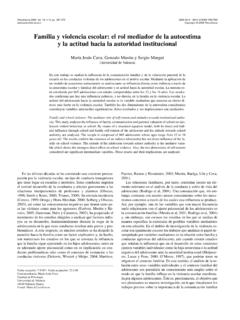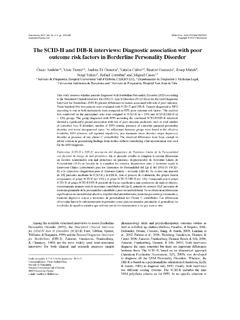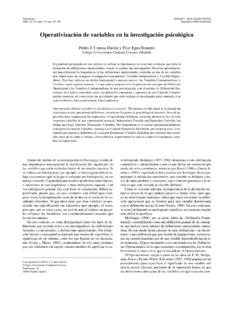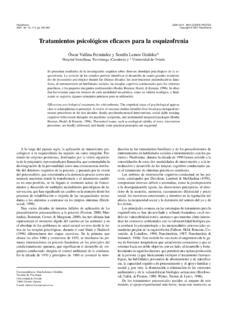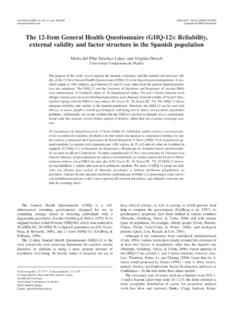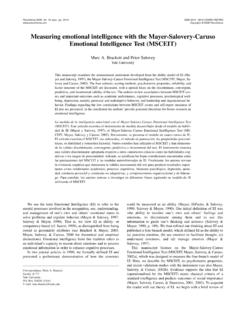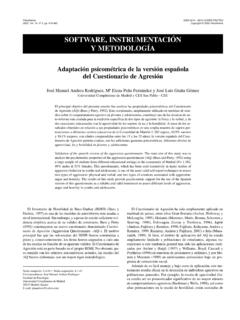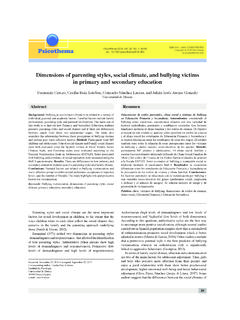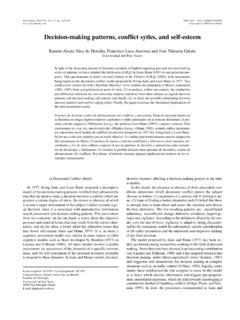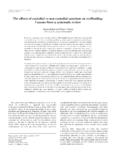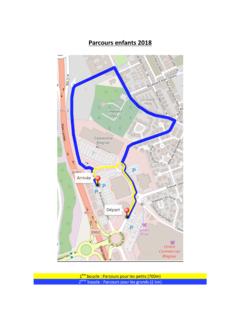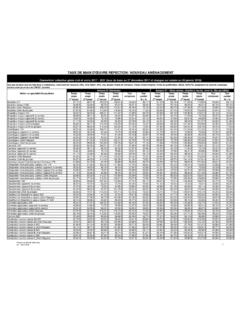Transcription of New validity evidence of the Parent PARQ/Control …
1 247 Interest in research into parental educational styles has increased during the last century, and it has been called upon to explain many changes in family structures (Tor o, Pe a, & Inda, 2008). Researchers have attempted to analyze the functioning of the dimensions which defi ne parental educational styles ( warmth, hostility, control, etc.) because the quality of the Parent -adolescent relationship may have an impact on children s psychosocial development (Escribano, Aniorte, & Orgil s, 2013; P rez, 2012).Thus far, warmth has been the central dimension in this area of research and refers to emotional proximity, support, and cohesion.
2 Moreover, in Baumrind s model it is connected with control in the authoritative style (1967). Maccoby & Mart n (1983) expanded Baumrind s work into four parenting styles: authoritative, authoritarian, indulgent, and neglectful. These four parenting styles involved combinations of acceptance/responsiveness/warmth (level of sensitivity and parents capacity to respond to their children s needs, mainly emotional requirements) and demandingness/control (requirements that parents use with their children to achieve certain goals, including behaviors such as involvement, discipline, and supervision).
3 Parent -child relationships have frequently been conceptualized in terms of interactions between two sets of parental attributes ( parental warmth /acceptance and rejection). A central theme of Rohner s interpersonal acceptance-rejection theory (IPART heory) seeks to explain the socialization which confi gures parental educational styles and predicts that parental acceptance and rejection have far-reaching consequences for children s health and social and emotional development. This theory demonstrates that high parental acceptance and low rejection of children are associated with a child s positive developmental outcomes (Rohner, ISSN 0214 - 9915 CODEN PSOTEGC opyright 2017 validity evidence of the Parent PARQ/Control scale of Parental Educational StylesOmar Garc a-P rez, Mercedes Inda-Caro and Susana Tor o-L pezUniversidad de OviedoAbstractResumenBackground: The Parent PARQ/Control (short version) for mothers and fathers is an inventory of 29 items where parents record their acceptance-rejection and control behaviors towards their children.)
4 Despite vast research on IPARQT heory, it has yet to be vali-dated for a Spanish population. The goal of this study is to analyze the psychometric properties of the instrument and its factorial structure. Method: Participants were 4,168 parents from the Principality of Asturias (2,166 mothers and 2,002 fathers). Mean age for mothers was years and years for fathers. Following preliminary studies, we carried out exploratory factor analysis (EFA) and confi rmatory factor analysis (CFA) for mothers and for fathers separately. Results: Analysis of mothers responses reveal an instrument comprising 15 items with a three factor-structure: warmth/affection, hostility/aggression and control.
5 For fathers, the structure of the inventory gave a 23 item instrument with four factors: warmth/affection, hostility/aggression, indifference/neglect and control. Conclusions: Overall, these results show that warmth/affection and control are the main dimensions in parental educational styles, and as hypothesized, mothers and fathers have different educational : Parent PARQ/Control , parents, educational styles, evidencias de validez de la escala Parent PARQ/Control sobre estilos de educaci n parental. Antecedentes: el Parent PARQ/Control (versi n corta, madre y padre) es un inventario de 29 tems en el cual los progenitores refl ejan las conductas de aceptaci n-rechazo y control que ejercen hacia los hijos e hijas.
6 A pesar de la investigaci n existente en relaci n a la IPARQT heory, este instrumento no ha sido validado en poblaci n espa ola. El objetivo de este estudio fue analizar las propiedades psicom tricas y la estructura factorial del instrumento. M todo: los participantes fueron padres y madres del Principado de Asturias ( madres y padres) con una edad media en las madres de 39,50 y en los padres de 41,90. Siguiendo los estudios previos, se realiz un an lisis factorial exploratorio y an lisis factorial confi rmatorio, para las madres y para los padres. Resultados: en relaci n a la versi n de la madre, se obtuvo una estructura factorial de tres factores (15 tems): afecto, hostilidad y control.
7 En la versi n de los padres, el instrumento (23 tems) con una estructura factorial de cuatro dimensiones: afecto, hostilidad, indiferencia y control. Conclusiones: los resultados muestran que las dimensiones de afectividad y control son las principales, y que las madres y padres presentan estructuras diferentes en los estilos de educaci n clave: Parent PARQ/Control , padres, estilos educativos, ni 2017, Vol. 29, No. 2, 247-253doi: Received: July 19, 2016 Accepted: December 21, 2016 Corresponding author: Mercedes Inda-CaroFacultad Formaci n Profesorado y Educaci nUniversidad de Oviedo33005 Oviedo (Spain)e-mail: Garc a-P rez, Mercedes Inda-Caro and Susana Tor o-L pez2482014; Rohner & Khaleque, 2002, 2010; Rohner, Khaleque, & Cournoyer, 2005a).
8 In accordance with the anthroponomical and universalist approach postulated by Rohner, several studies (G mez & Rohner, 2011; Khaleque & Rohner, 2002; Rohner et al., 2005a; Rohner & Khaleque, 2010) have indicated that research over the course of fi ve decades in every continent has shown that children and adults organize their perceptions of acceptance and rejection around the same classes of behavior. Thus, the factorial structural analysis of this model posits two constructs that defi ne the acceptance factor: warmth/affection and hostility/aggression. Warmth behavior is related to physical and verbal actions like hugs, kisses, and praise, whereas the hostility/aggression dimension is defi ned by physical and verbal behaviors such as hitting, kicking, scratching, cursing, and saying sarcastic, thoughtless, or cruel things (Rohner et al.)
9 , 2005a, p. 7). Similarly, two factors explain parental rejection: indifference/ neglect (physical and psychological unavailability and a parental attitude of not paying attention) and undifferentiated rejection (lack of love and unappreciated or uncared-for behaviors). Moreover, Rohner, & Khaleque (2005) stated that the control dimension should be considered when explaining parental educational behaviors. This factor also evaluates the degree to which parents insist that their children comply with their rules, directives and prescriptions. Most socialization researchers agree that behavioral control (permissiveness-strictness) refers to the attempts made by parents to regulate, manipulate, or manage their children s behavior.
10 Nevertheless, although parental control and warmth may be independent in theory, the literature has not established whether this is true across all cultures. For example, parental control is positively associated with perceived parental warmth among adolescents in Asia, but negatively associated with warmth among young people in North America and Germany (Deater-Deckard et al., 2011). Therefore, Rohner & Khaleque (2005) created the Parent PARQ/Control questionnaire to evaluate this theory. Several studies have been carried out to validate this measure in different cultural contexts (Deater-Deckard et al., 2011; G mez & Farhana Suhaimi, 2015; G mez & Rohner, 2011; Khaleque & Rohner, 2002; Rohner & Khaleque, 2003; Rohner & Khaleque, 2005; Rohner et al.)
